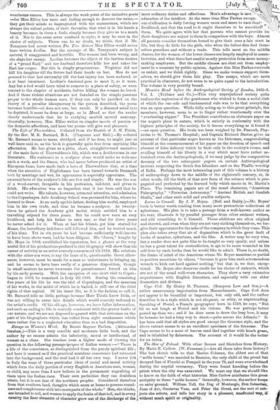question in the following passage 'epropos of Italian women :—"
There is The Star of Poland. With other Scenes and Sketches from History. a life of the conscience, as distinguished from the purely spiritual life ; By Maria E. Catlow. (W. Freeman.)—Are all these tales from history ? and here it seemed as if the practical mundane conscience had retreated The last sketch tells us that Marius Colonna, the eldest son of that into the background, and the soul had it all her own way. I never felt "noble house," was married to Beatrice, the only child of the proud but in Italy the want of those particular ideas of social and moral activity decayed line of Fieschi at Pompeii in the year 79, and were overwhelmed which form the daily portion of every English or American man, woman, during the nuptial ceremony. They were found kneeling before the or child, any more than I now believe in the permanent engrafting of priest when the city was excavated. We must say that we should like them upon the Italian race. Their own perfection they can doubtless to know on the faith of what historian Miss Callow attributes this great attain, but it is not that of the northern peoples. Considered therefore antiquity to these "noble houses." Generally, however, the author keeps from that southern land, thoughts which seem at home to possess round- on safer ground. William Tell, the Dog of Montargis, Don Sebastian, nese and completeness sink into mere parts of the whole." Men, she thinks, JO= of Arc, Gustavue Vasa, and Peter the Great, are the sort of aub- 0
beauty becomes in them a fault, simply because they give us too much them. We quite agree with her that parents who cannot provide for of it. Nor is the same error confined to style ; it may be seen in the their daughters are unjust to them in comparison with the boys. Almost choice of subjects. There can be no doubt, we think, that if Mr. all parents consider themselves bound to give their sons a fair start in Tennyson had never written The Two Sisters Miss Ellice would never life, but they do little for the girls, who when the father dies find them- have written Leoline. But the revenge of Mr. Tennyson's subject is selves penniless and without a trade. This tells most on the middle natural, if exaggerated and horrible. The woman had been wrong, and classes, for the women of the lower classes are largely employed in menu- she slays her enemy. Leoline becomes the object of the lawless desires factories, and what these last need is mostly protection from mere money- of a "proud Earl," and her husband therefore kills her and takes the making employers. But the middle classes are shut out from employ- Earl her corpse. Bat this is simply preposterous. Virginius did not ment in a measure by public opinion. Against this Miss Parkes contends kill his daughter till the haters had their hands on her. Men do not as unfair, and we think rightly. Since we make women support them-






























 Previous page
Previous page